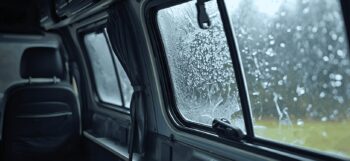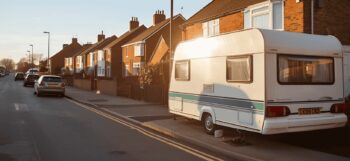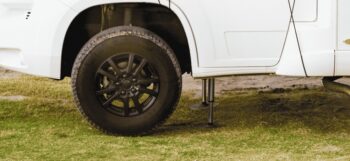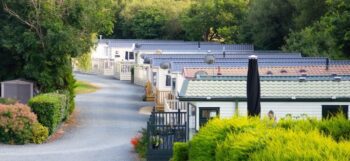Owning a static caravan can offer an escape from everyday life, providing you with a place to stay at your favourite location by the coast or countryside.
But beyond the purchase price, what does it really cost to own a static caravan in the UK, per year? If you're looking to make a well-informed decision, our guide aims to break down the running cost and associated fees, insurance, maintenance, depreciation and more.
Pitch fees
Pitch fees, sometimes referred to as site fees, are probably the most significant annual cost associated with owning a static caravan.
What do pitch fees cover?
Caravan pitch fees cover the plot your caravan is sited on at the holiday park and also for use of the park’s facilities e.g., entertainment, leisure, grounds maintenance.
UK pitch fees range in price, depending on where your caravan is situated. Generally, location is key so you may pay more on coastal or high-demand holiday parks, than you would on smaller inland parks or rural sites.
It is important to be mindful of annual pitch fee increases and extra costs that could be incurred for access passes for friends or family.

Utility bills
Just like our homes, static caravans require utilities, such as gas, electricity and water. The usage of these can vary with frequency of visits and whether you’re using the caravan year-round.
Gas
Gas is a key element of your static caravan running costs, especially if you use your caravan during early spring to late summer.
Types of gas supply for static caravans
Many holiday parks supply gas in one of two ways:
- Bottled LPG (Liquefied Petroleum Gas): This usually comes in large 47kg cylinders. Some parks will deliver and fit them, while others expect you to handle this yourself.
- Piped gas: This is less common but may be available on some larger or newer sites. This setup works like a mains gas supply and is charged based on metered use.
Some parks only allow you to buy gas through them. This can work out more expensive than buying it yourself, so it’s worth asking about this before you commit to a pitch. Gas bottle pricing depends on the current market rates for LPG gas. When purchasing gas for the first time, you'll typically need to exchange an empty bottle for a full one. If it's your initial purchase, you’ll pay for both the bottle and the gas it contains, meaning you’ll be charged the full price of a new bottle. However, once your bottle is empty, you can exchange it for a full one at a lower refill price, which is cheaper than the cost of your first full bottle.
A 47kg bottle is said to last between 4–6 weeks* depending on how often you use your heating, hot water and hob. In winter or during full-time use, expect to go through more gas in a month. In summer, with lower usage, one bottle could stretch to a month or longer.

Electricity
Electricity is one of the main static caravan running costs, especially during colder months when heating, lighting, and appliances are in constant use. The way your park charges for electricity can significantly impact your overall annual utility costs.
Charging methods
Parks typically charge for electricity in one of two ways:
- Metered charges: Many parks charge based on your actual electricity usage, which is measured by a meter reading. This can be more cost-effective if you use electricity sparingly.
- Flat rate: some parks charge a fixed rate for electricity as part of the pitch fee, regardless of how much electricity you use. This can be easier to manage but may result in overpayment if you're a light user.
Average annual costs
In 2024, Holiday Park Guru reported that the average combined gas and electricity bill for a static caravan sited at a Haven Holidays park was £721, per year. The amount you pay will depend on:
- The size of your caravan: Larger caravans often contain more items that run off electric, e.g., air conditioning or additional heaters, which will naturally use more electricity.
- Usage: If you use your caravan year-round or in the winter when heating and lighting are on for longer periods, your electricity costs are likely to be higher than if you are a seasonal or occasional user.
- Energy efficiency: Older caravans with poor insulation or outdated appliances may lead to higher electricity consumption compared to modern, energy-efficient models.
Factors impacting electricity costs
The more time you spend in your caravan, the more electrical appliances you are likely to use, resulting in higher electricity consumption. Heavy use of heaters, air conditioning, or high-power appliances like microwave ovens and dishwashers will naturally increase costs. To reduce your electricity consumption, consider investing in LED lighting, low-energy appliances, and smart thermostats which can help reduce electricity costs over time.

Water and waste
When determining the cost of owning a static caravan, it’s important to take water supply and waste disposal into consideration. How much they cost will depend on how your park handles these services and your personal usage.
Water supply and sewerage charges
In many cases, water supply and sewerage costs are factored into your annual site fees, so you don’t have to worry about paying separately for either. This is common with parks that operate a flat-rate pricing system, where you pay a set amount regardless of your usage. At some parks, water and waste charges are metered, meaning you only pay for what you use. This is particularly common in parks where owners stay for longer periods or year-round, as the usage will likely be higher.
What you pay may depend on:
- Park location: Some parks, especially those in more rural areas, may have higher water costs due to the infrastructure needed for water delivery and waste disposal.
- Caravan usage: If you are a seasonal user, water charges could be lower than if you are a frequent or an all year-round user, who has frequent guests.
- Park's billing system: If water is included in the pitch fee, your costs will be fixed. However, if it’s billed separately, you could see cost variations based on the time of year, how often you stay, and how efficiently you use water.
Tips for reducing water and waste costs
Simple upgrades, such as water-saving showerheads and low-flow taps, can help to reduce your water consumption and lower your costs. Pay attention to your usage. Turn off taps, for example, when not in use while brushing your teeth and showering and consider limiting showers and baths to conserve water.
Water and waste services can be overlooked when budgeting for your annual fees. However, as part of your overall static caravan running costs, they should be factored in early on. Even if water is included in the pitch fee, knowing how much it would cost separately can help you better plan for fluctuations in annual fees or site costs.
Maintenance and repairs
Owning a static caravan requires regular upkeep to ensure that it remains in good condition, is safe to stay in, and remains compliant with warranties and park rules. Proper, regular maintenance cannot only help to preserve your caravan’s longevity but also helps to maintain its value and prevent larger, more expensive repairs down the line.
Costs will vary depending on how often you use your caravan, how well it is taken care of, and whether you choose to handle maintenance yourself or use professionals. When budgeting for your static caravan annual fees and total static caravan running costs, this should be taken into account as part of your long-term financial planning.
Maintenance costs
Here is a list of the most common tasks that should be carried out on an annual basis. Some of which may need to be carried out by a professional service provider:
- External cleaning and moss removal: The exterior of your caravan can quickly accumulate dirt, debris, and moss, especially during the wetter months. Moss can cause damage to the exterior surface if left untreated. Cleaning the exterior regularly will not only help to prevent long-term damage, but improve the caravan’s appearance, and help to preserve its value.
- Gutter checks and roof inspections: Your caravan’s roof and gutters play an important role in preventing leaks and water damage. Ensure gutters are clear of moss and debris, and the roof is free from cracks, holes, or damage. Even small issues can escalate quickly, so addressing them early will save on bigger repair bills later down the line.
- Damp checks: Damp can be a significant issue in static caravans, particularly in the UK’s rainy climate. Regularly checking for signs of damp or water ingress can help to prevent more serious issues like mould and rot. Many parks will have damp-checking protocols as part of their inspections, but it’s always wise to do your own checks too.
- Re-sealing windows and joints: Over time, windows and doors seals, and joints can wear down or crack. This will allow cold air, moisture, or pests to enter the caravan. Re-sealing these areas can help improve insulation and prevent damage from the elements.
Replacing worn parts or fittings: Wear and tear on components like doors, windows, furniture, or appliances is inevitable. Regular checks for these issues and prompt repairs or replacements can prevent further deterioration and the need for costly fixes.

Additional maintenance considerations for static caravan ownership
In addition to regular annual tasks and cleaning services, there are a few other things to consider for the ongoing upkeep of your caravan:
- Gas and Electrical Systems: It's important to ensure that your gas and electrical systems are properly maintained and safe to use. Annual safety checks on appliances like the boiler, heating system, and gas lines are often required, both for your safety and to comply with insurance policies. A Gas Safety Certificate is required annually if renting out or if the park mandates it. You should expect to pay no more than £100 to acquire this certificate. It is recommended that an Electrical Inspection Condition Report (EICR) is carried out every three to five years, and smoke detectors /carbon monoxide alarms should be checked and maintained yearly.
- Pest Control: If your caravan is left unused for long periods, pests can become an issue. Regular checks and preventative measures like using insect repellents or installing traps can help keep your caravan pest-free.
- Winterising Your Caravan: If you plan to leave your caravan unused for an extended period during winter, consider taking steps to protect it from freezing temperatures. Draining the water system, insulating pipes, and using antifreeze can prevent costly damage.
Depreciation
While not a cash expense, static caravan depreciation can affect long-term value. New static caravans lose value rapidly, up to 15% in the first year. The National Caravan Council (NCC) advise that static caravans should be considered a lifestyle purchase, not an investment, and owners should not expect high resale values*.
Optional Extras
Depending on how you plan to use your caravan, you may need to budget for the following:
- Timber or composite decking
- Outdoor furniture or storage
- WiFi, TV - Some parks provide WiFi or satellite TV for a fee
- Hot tubs – This would include the initial purchase and installation, plus ongoing maintenance
Static Caravan Insurance
Specialist static caravan insurance is a yearly essential consideration — and often a requirement of the holiday park.
At Lifesure, we have a wealth of experience helping our customers find static caravan insurance to suit their budgets and requirements. Our friendly UK-based team are on hand to answer any questions you have, to help you to find the ideal policy for your static caravan.
Fill in our online form to get an instant quote or call us on 01480 402 460 and one of our team will be happy to help.
*Source: https://www.shropshiregas.com/latest-news/613-complete-guide-to-gas-bottles-for-caravans
FAQs
How much does it cost to run a static caravan each year?
Annual costs are determined by site fees, utilities, insurance and maintenance. This will vary from person to person.
Are pitch fees included in the price of a static caravan?
No — pitch fees are separate and paid annually to the holiday park.
Is static caravan insurance mandatory?
Most parks may require it as part of your agreement.
Do static caravans go up in value?
No — they depreciate over time. Consider them a lifestyle investment rather than a financial one.
Disclaimer: The sole purpose of this article is to provide guidance on the issues covered. This article is not intended to give legal advice, and, accordingly, it should not be relied upon. It should not be regarded as a comprehensive statement of the law and/or market practice in this area. We make no claims as to the completeness or accuracy of the information contained herein or in the links which were live at the date of publication. You should not act upon (or should refrain from acting upon) information in this publication without first seeking specific legal and/or specialist advice. Arthur J. Gallagher Insurance Brokers Limited trading as Lifesure accepts no liability for any inaccuracy, omission or mistake in this publication, nor will we be responsible for any loss which may be suffered as a result of any person relying on the information contained herein.
FP637-2025











